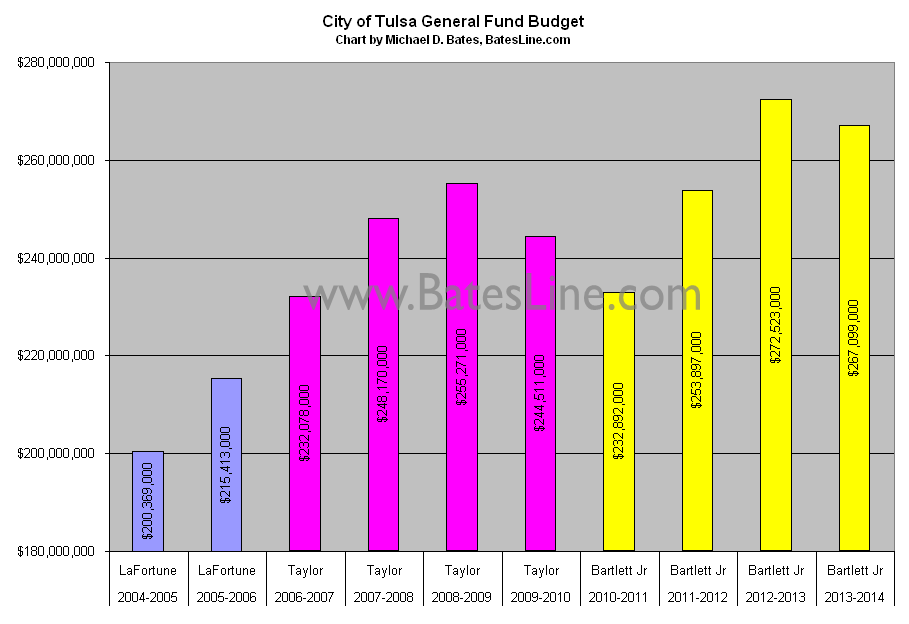Kathy & Dewey's budget roller coaster
Tulsa Mayor Dewey Bartlett Jr has released his proposed budget for the upcoming 2013-2014 fiscal year, which begins July 1. (That's an 8 GB PDF.) The budget is slightly lower than last year, reflecting the drop in revenues that caught Bartlett Jr and his administration by surprise, leading to a hiring freeze for the last quarter of the 2012-2013 fiscal year.
The above chart shows the general fund budget over the last 10 years. The complete city budget includes many other funds, but the general fund is a good apples-to-apples comparison, as it doesn't include fee-for-service funds like trash and water. This is the part of the budget where the mayor has the most control.
What you'll notice is a steep climb in the general fund budget under Taylor and again under Bartlett Jr, with a drop in the middle under both mayors when the 2008 recession hit Tulsa and sales tax revenues plummeted.
Here's the thing to remember about government budgeting in Oklahoma. The Oklahoma State Constitution and state statutes require a balanced budget for the state and all of its political subdivisions. While you can issue bonds for capital improvements, you can't simply get out the credit card to pay for operations when you want to spend more than available revenues. A mayor has to cut spending. There is no other option when revenues are down.
But when times are fat and revenues are flowing, a mayor does have a choice: He or she could show restraint and hold spending increases to the rate of inflation. A few voices -- former City Councilor John Eagleton was the most prominent -- called for restraining the growth of government to the rate of inflation, but those voices were ignored.
The other option: The mayor could expand existing programs, create new programs, and allow spending to increase to consume all available revenues, making cuts all the more painful when revenues contract, as they eventually will.

Kathy Taylor opted for the latter course. Taylor boosted the general fund budget by 18.5% over three years, half again faster than the rate of inflation over the same period (June 2005, when Bill LaFortune's last budget was approved, to June 2008, when Taylor's peak budget was approved). Had Taylor kept her spending increases to the rate of inflation, no cuts would have been necessary -- the 2008-2009 budget would have been $242.3 million instead of the actual amount of $255.3 million, and the actual 2009-2010 budget of $244.5 million would have represented an increase.

Dewey Bartlett Jr was an even bigger spendthrift than Kathy Taylor. He cut when he had to in FY 2010-2011, to stay within available revenues, but then Bartlett Jr's general fund budgets rose 17% in just two years, over a period (June 2010 to June 2012) when the CPI rose only 5%. Once again, had Bartlett Jr held his spending to the rate of inflation, the 2012-2013 budget would have been only $245.2 million.
Had spending been held to the rate of inflation through both the Taylor and Bartlett Jr administrations, the City of Tulsa would have avoided painful budget cuts and would have a fatter rainy day fund.
It's time Tulsa got off of the budget roller coaster and took a more cautious, conservative, and steady approach to city budgeting.
MORE: Download the FY13-14 City of Tulsa Proposed Budget.
Here's a table showing the Consumer Price Index month-by-month going all the way back to 1913.
0 TrackBacks
Listed below are links to blogs that reference this entry: Kathy & Dewey's budget roller coaster.
TrackBack URL for this entry: https://www.batesline.com/cgi-bin/mt/mt-tb.cgi/6836
